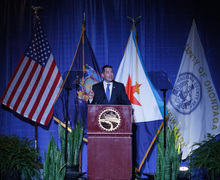Goldberg: Clinton’s vice presidential pick should bring balance to her ticket
With over a year and a half until the 2016 presidential election, the Democratic nomination is as open as it could possibly be — yet with only one candidate declared with intent to run, the nomination has all but been granted.
The de facto nominee? Hillary Clinton, of course.
With Clinton’s nomination basically guaranteed, it’s time to start thinking about the general election. Without a significant challenge in the primaries, which would provide her the opportunity to show the country what she’s all about, a strong launch for the general election is a must. Perhaps the most important facet of her general campaign will be choosing the right vice president.
A vice presidential candidate can easily make or break a ticket. Sarah Palin ruined John McCain’s (R-Ariz.) presidential hopes in 2008; at the same time, President Barack Obama’s choice of Joe Biden may have been the final touch to his recipe for success. Biden brought what Obama lacked: experience — 36 years of it — and a modest nature that felt comfortable and familiar to blue collar Americans.
It’s imperative that Clinton and her team think critically and pick a running mate who’ll compliment her experience and fill in some of the gaps where she’s expected to lapse.
Since before Clinton announced her candidacy, think piece upon think piece has been published discussing potential VPs for her ticket. Some names are based more in fantasy than practicality — for example, Elizabeth Warren (D-Mass.) or Wendy Davis — where there’s almost no chance, and nothing to be gained from having either of them on the ticket. Hillary, as the first serious female presidential candidate the nation has seen, would quickly find that America is certainly, and perhaps unfortunately, not ready for two women to lead the country. On top of that, Warren’s age and liberal tendencies overlap much too closely with Clinton’s.
The appeal of “firsts” has also led to the suggestion of Sen. Cory Booker (D-N.J.), who despite being popular among African-American voters, has his popularity centered in the northeast and wouldn’t necessarily add any new populations to Clinton’s supporters.
Booker would have brought something to the ticket that can’t be ignored. Despite having a strong background in politics, with executive experience, he has never been considered a “Washington insider” — today a political slur strong enough take down a candidate on its own. There are few politicians around who have that label so deeply branded into their identity as former First Lady/Senator/Secretary of State Hillary Clinton. A strong vice presidential candidate in her case needs to be as far removed from the political machine as possible.
By avoiding the political elite, Clinton would likely have to rule out a few great candidates, including Agriculture Secretary Tom Vilsack, who could bring her the swing state of Iowa; and Virginia senators Tim Kaine (D-Va.) and Mark Werner (D-Va.), both of whom have the clean-cut look and spotless backgrounds that could have balanced out Clinton’s semi-scandalous past.
By removing these “insiders” from the picture, Clinton would leave herself with a group of options that, while trending white and male, are young enough to energize millennials, moderate enough to extend a more bipartisan hand than Clinton’s liberal leanings and experienced enough to add quality to the ticket. Her top prospects end up as: Gov. John Hickenlooper, who not long ago won a major victory in becoming the governor of Colorado; Sen. Martin Heinrich (D-N.M.), welcomed on both sides of the aisle for his moderate gun control views; and potential Clinton challenger, Maryland Gov. Martin O’Malley.
Clinton’s best choice of the bunch, however, is Department of Housing and Urban Development Secretary and former Mayor of San Antonio Julian Castro. As the youngest member of Obama’s cabinet, Castro brings youth and vigor in combination with a telegenic attitude and appearance. His appeal to the nation’s Hispanic population would likely prove critical in an election where almost every major Republican candidate has a significant pull on the Hispanic vote. Add in a near guarantee of taking Texas, where he is immensely popular and which would hopefully swing some other Southern states blue, and you’ve got yourself an ideal candidate.
Though the announcement of the Democratic ticket will wait until after the convention in July, Clinton would be smart to start testing the waters on these top candidates for the VP spot. With such a large spotlight on Clinton’s campaign, there’s no such thing as being too prepared.
Zach Goldberg is a senior economics, policy studies and energy and its impacts major. His column appears weekly. He can be reached at zrgoldbe@syr.edu and followed on Twitter @zgolds.
Published on April 22, 2015 at 11:41 pm





